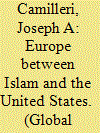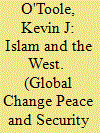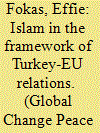|
|
|
Sort Order |
|
|
|
Items / Page
|
|
|
|
|
|
|
| Srl | Item |
| 1 |
ID:
080703


|
|
|
|
|
| Publication |
2008.
|
| Summary/Abstract |
Europe and its leaders, though they may not fully comprehend the significance of the events that are rapidly unfolding, and whether they like it or not, are key players in the historical process that will shape the geopolitics of the Middle East and Islam's response to the challenge of modernity. This is not say that Europe has it in its power to determine the choices that Iran and the Arab world will make, nor indeed should it attempt to do so. On the other hand, it does have a margin of manoeuvre which, depending on the way it is exercised, may tilt the balance in favour either of the politics of coexistence and cooperation or the politics of confrontation. European choices and capacities will revolve around four questions: How will European policies and attitudes position themselves vis- -vis the Orientalist tendencies of the past? What steps might be taken to clear the backlog of unresolved geopolitical tensions and misunderstandings? Can Europe develop a programmatic approach to regional and international governance which accepts cultural plurality as its foundation stone, even if this should create tensions in the transatlantic relationship? Is Europe disposed to forge a new social compact that accepts Muslims in Europe as European citizens fully engaged in the task of European construction? The article argues that these are not four unrelated questions, each with its own separate logic and modus operandi, but four mutually constitutive policydilemmas that will in large measure reflect and in part shape European efforts to fashion a new identityand sense of place in the world
|
|
|
|
|
|
|
|
|
|
|
|
|
|
|
|
| 2 |
ID:
080709


|
|
|
|
|
| Publication |
2008.
|
| Summary/Abstract |
'Europe' is supposed to be an Enlightenment project that embodies the accumulated experiences of modernity. This project declares that secularism and human rights are the basic conditions for creating an ideal world that is expected to be embodied within the institution of the European Union. The integration of Europe has been based above all on the acceptance of standardized human rights that are the expression of the heritage of the Enlightenment. The realization of human rights requires political neutrality towards all religions, which in turn guarantees the legal equality of all citizens. It is only if secularism can be made the social and legal foundation of Europe that Turkey's accession to the EU as a Muslim country might be made possible. Otherwise the EU is most likely to remain a Christian-oriented union within a non-secular context. However, there seems to be some resistance to accepting Turkey on religious grounds. This in turn undermines the so-called 'European values' (at the top of which is secularism) and revives the religious memory of Europe. The cases investigated in the European Court of Human Rights demonstrate that religious differences are still taken into account within the European project and that this has become a new barrier to the true realization of 'European values'. This paper aims to analyze the causes and effects of this encounter and the ways in which it is viewed within the Turkish-Islamic world with special references to its role in shaping a nationalist or Islamist identity that may work to counter Turkey's integration with Europe
|
|
|
|
|
|
|
|
|
|
|
|
|
|
|
|
| 3 |
ID:
080704


|
|
|
|
|
| Publication |
2008.
|
| Summary/Abstract |
Whether or not the notion of the world as made of civilizations in varying degrees of alliance or conflict is valid, and however reliable or unreliable the idea of an 'Islamic World' or a 'Western World', it is an indisputable reality that there are histories and institutions that are described by and purport to be 'of the West' and 'of Islam'. Indeed, it is commonplace in discourse about international affairs to refer to Islam and the West as distinguishable by values and the 57 nations that comprise the Organization of the Islamic Conference (the OIC) and the 47 nations that comprise the Council of Europe (COE) purport to represent the values respectively of Islam and the West. As usually expressed, however, the frequently used comparative values individualism, piety, liberalism, rule of law, family, abstemiousness and so on are, epistemologically, arguably worthless. Can values be identified for Islam and the West that provide an epistemologically valid distinction? When the OIC and the COE are analysed by reference to what they say and do, the analysis being tested for consistency against the historical origins of these organizations, a case can be made that epistemologically useful respective values can be identified. Thus, for each of the person who will be referred to as 'the Muslim Man' and the person who will be referred to as 'the Western Man', there is distinct doctrine and practice. The doctrine and practice of the Muslim Man extol a virtue of conviction. The doctrine and practice of the Western Man extol a virtue of doubt. For the Muslim Man conviction is unconditional, for the Western Man conviction is contingent; the one enjoys unconditional certainty, the legacy of a revelation; the other suffers reservation, the legacy of an experience of error. What for one is a virtue, for the other is a vice. Their respective dispositions are mutually exclusive.
|
|
|
|
|
|
|
|
|
|
|
|
|
|
|
|
| 4 |
ID:
080708


|
|
|
|
|
| Publication |
2008.
|
| Summary/Abstract |
The notion that Turkish potential membership has provoked-or exacerbated-an 'identity crisis' for the European Union is by now a familiar truism. This article is concerned with the specifically religious identity crisis sparked by the Turkish accession process to the (secular) European Union. It takes a broadly comparative approach to the role of Islam in the Turkish political sphere and the role of religion within the European Union, suggesting that a parallel examination sheds light on a number of telling similarities between the two pictures. Complex interplay between religion, secularism, national identity and European identity is a recurrent theme here. Placed within the broader framework of discussions on the place of religion in the European public sphere, this examination yields insight into the state of flux characterising religion in Europe, which, in turn, may bear repercussions for Islam in the Turkish political sphere, for Islam within the EU and for Turkey-EU relations
|
|
|
|
|
|
|
|
|
|
|
|
|
|
|
|
| 5 |
ID:
080707


|
|
|
|
|
| Publication |
2008.
|
| Summary/Abstract |
Until the end of the twentieth century, Turkey's East-West paradigm found refuge in the ambiguous construct of Eurasia and was entrenched in an authoritative centralised state. With EU candidature and the radical reforms ushered in by the Islamist-based government, the Turkish Republic finds itself at its most critical juncture since its formation in 1923. In reviewinccg Turkey's reform process, the paper exposes the rifts in its dual Western-Anatolian personality, the ineptness of its Eurasia synthesis, the fragility of its special relationship with the United States and the inherent contradictions embedded in Kemalist statism. The paper argues that by seeking to join the EU, Turkey has also-inadvertently-embarked on a collision course with the Kemalist Devlet (state). The paper surveys the (European) fault line that currently divides Turkey, accentuating deep-seated dualisms-some dating to Ottoman times-that have been concealed by the Kemalist state. Finally, the paper argues that success (or failure) of the Euro-Turkish 'project' hinges on Turkey's capacity to reconcile itself with its suppressed historical past and radically reform the inherent contradictions of Kemalism-at the core of which is the military's inherent role as custodians of the Kemalist state.
|
|
|
|
|
|
|
|
|
|
|
|
|
|
|
|
| 6 |
ID:
080706


|
|
|
|
|
| Publication |
2008.
|
| Summary/Abstract |
Until the middle of the twentieth century, Muslims living in European countries were mainly indigenous people, completely assimilated with the rest of the population. Both their religion and their representative organizations enjoyed legal recognition, sometimes centuries long.
A significant influx of immigrants of Muslim origin to Europe began in the mid twentieth century and a need for legal regulations sanctioning the status of Muslims within largely Christian societies became apparent. Their situation in this respect differs from country to country, sometimes due to a lack of an organization that would represent all the Muslims in a particular country, sometimes because of legal technicalities. In some countries, it is not even possible for Muslim immigrants to become citizens.
The legal situation of Islam and its adherents exerts an important influence on their attitude towards their new country of residence and towards Europe, as well as significantly influencing their loyalty
|
|
|
|
|
|
|
|
|
|
|
|
|
|
|
|
| 7 |
ID:
080705


|
|
|
|
|
| Publication |
2008.
|
| Summary/Abstract |
This article analyses the social and cultural dislocation that Muslim communities are currently experiencing in contemporary European society against the background of an increasingly vague and ill-defined European socio-cultural identity. The principal objective is to assess whether this dislocation should be interpreted as a problem pertaining to Islam or to what extent it mirrors and is fuelled by Europe's own cultural dilemma. As such, the article examines the current socio-cultural impasse that overshadows much of the relationship between Muslim communities and Europe in order to assess the implications of this major internal challenge to the future of the European project
|
|
|
|
|
|
|
|
|
|
|
|
|
|
|
|
|
|
|
|
|